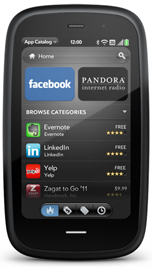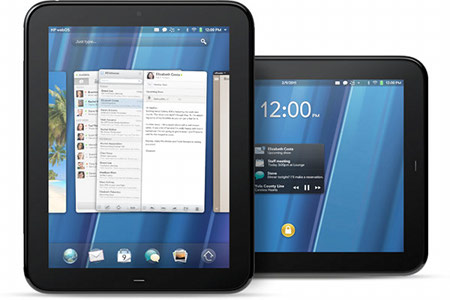HP Pre 3 debuts in the U.K. as TouchPad struggles stateside
Aug 17, 2011 — by Eric Brown — from the LinuxDevices Archive — 7 viewsThe WebOS-based HP Pre 3 smartphone is now available in Europe, and will “soon” be arriving in the U.S., says HP. Meanwhile, HP TouchPad sales are sluggish despite 20 percent price cuts on the tablets, and HP is now trying to push WebOS into cars and kitchen appliances, say two separate reports.
HP's online Palm Eurostore has begun selling the HP Pre 3 smartphone for 299 U.K. Pounds ($492), and is ready to ship within 1-2 business days. The Pre 3 is also available at the Clove U.K. store for 322.80 Pounds ($531), or 269 Pounds ($443) without VAT (value added tax), and at the Box U.K. store for 300 Pounds or 250 Pounds ($411) without VAT. 
All three versions, which were first detected by PreCentral.net, are available unlocked, and equipped with 8GB of memory. HP informed PreCentral.net that plans for a U.S. release of the Pre 3 would be revealed "soon."
Announced in February along with the 2.6-inch, 800MHz HP Veer phone, the HP Pre 3 (pictured) is a larger, faster update to the Palm Pre 2. The Pre 3 runs the Linux-based WebOS 2.2 operating system that HP acquired when it bought Palm.
Equipped with a 1.4GHz Qualcomm Snapdragon MSM8x55 processor, the Pre 3 offers 512MB RAM, and either 8GB or 16GB of internal flash memory. It lacks a microSD slot, but offers a USB port for adding storage.
The phone offers 3G, 802.11b/g/n, GPS/aGPS, Bluetooth 3.2, and optional Wi-Fi mobile hotspot functionality, says HP. In addition to the rear-facing five-megapixel autofocus camera with flash, capable of 720p video recording, the device offers a front-facing VGA webcam, says the company. Additional features are said to include a headset jack, and the usual sensors.
The 4.37 x 2.52 x 0.63-inch device weighs 5.5 ounces and runs on a 1230mAh battery, says HP. The Pre 3 offers a gesture area beneath the display, enabling the user to swipe right to left to go back to a previous page, website, or mode, and a reverse swipe to go forward.
The Pre 3 is said to be compatible with the HP Touchstone inductive charging device. It also supports the Touchstone-related technology in HP's TouchPad that lets users tap the phone against the tablet's screen to exchange URLs and text messages between the devices. One can even start a phone call on the Pre 3 and continue it on the tablet, says HP.
HP TouchPad sales fail to ignite, says report
Both the HP Pre 3 and Veer phones were introduced in conjunction with the HP TouchPad tablet, which runs a more advanced, tablet-oriented 3.0 version of WebOS. The 9.7-inch tablet, which features a 1.2GHz dual-core Qualcomm Snapdragon APQ8060 processor, went on sale July 1 for $499 (16GB) and $599 (32GB) in the initially available Wi-Fi only version.
The TouchPad was troubled from the start by mixed reviews, which generally praised WebOS 3.0 but criticized the device for bugs, sluggish performance, and limited battery life. But the biggest problem is the lack of apps — which could prove to be a killer in a world full of iPads and Android tablets.
Apparently, buyers are having similar concerns. Despite recent price cuts of up to 20 percent, sales of the TouchPad are sluggish at Best Buy stores, according to AllThingsD. A source who has seen internal HP reports informed the publication that Best Buy has taken delivery of 270,000 TouchPads, but has so far sold only 25,000, or less than 10 percent of the inventory.

HP TouchPad
Another source who was said to have seen Best Buy's TouchPad sales figures generally confirmed the results, but noted that the 25,000 unit-sales figure might be "charitable," as it may not account for returns. The poor sales have caused tension between HP and Best Buy executives, AllThingsD claims.
Meanwhile, Envisioneering Group analyst Rich Doherty told the publication that spot interviews at Wal-Mart, Micro Center, and Fry's suggested that HP's price cuts have prompted consumers to wait for further reductions. HP has cut the price by $100 — 20 percent — to $399 and $499 for the 16GB and 32GB models, respectively.
HP pushes WebOS at cars, refrigerators
Meanwhile, HP is talking to manufacturers about licensing WebOS for a wider variety of devices such as automobiles and appliances, including smart refrigerators, according to the Wall Street Journal.
"We're looking at expanding the base and bringing to the webOS community an ecosystem that inspires developers out there," HP WebOS chief Stephen DeWitt reportedly told the Journal. No specific manufacturers or developers were cited, however.
One analyst quoted by the Journal, Gartner's Thilo Koslowski, was skeptical about HP's prospects in the in-vehicle infotainment (IVI) market. "The automobile industry has no interest in changing suppliers every year," he was quoted as saying.
Meanwhile, automotive vendors are already being approached by companies touting other mobile device platforms. Ford's Sync IVI system is one of many using Microsoft's Windows CE, and Android, too, is working its way into IVI systems. An Android-based Saab IQon system was announced in March.
Meanwhile, five Linux distributions, including specialized versions of MeeGo and Ubuntu, have just been confirmed as compliant with the Genivi Alliance open source IVI spec. As for smart refrigerators, Linux has already been there, done that on an Electrolux system.
 In June, a Bloomberg story quoted HP CEO Leo Apotheker (pictured at right) as saying HP was in discussions with mobile device vendors about licensing WebOS for smartphones. Samsung was one of those companies, the story said. So far, however, nothing seems to have emerged from the talks.
In June, a Bloomberg story quoted HP CEO Leo Apotheker (pictured at right) as saying HP was in discussions with mobile device vendors about licensing WebOS for smartphones. Samsung was one of those companies, the story said. So far, however, nothing seems to have emerged from the talks.
Earlier, HP said it planned to integrate WebOS on laptops and printers. Also revealed were plans to offer a dual-boot WebOS option on HP's Windows desktops starting in 2012.
This article was originally published on LinuxDevices.com and has been donated to the open source community by QuinStreet Inc. Please visit LinuxToday.com for up-to-date news and articles about Linux and open source.